If you’ve ever wondered, “can dogs eat pancakes?” you’re in for a treat! Let’s uncover the paw-some facts about dogs and pancakes.
Key Takeaways:
- Plain pancakes made with simple ingredients like egg, milk, flour, butter, sugar, and baking powder are safe for dogs to eat.
- Pancakes should be given in moderation and without any toxic ingredients like chocolate, raisins, or sugar-free maple syrup.
- Toppings like strawberries, peanut butter, bananas, and apples can be added, but raisins and sugar-free maple syrup should be avoided.
- Pancakes made from different types of flour, protein, or almond flour are fine for dogs as long as they are plain and given in moderation.
- Dogs should not eat pancakes with syrup as it is high in sugars and can lead to obesity and diabetes.
Are Pancakes Safe for Dogs?
Feeding pancakes to your dog can be a delightful and safe experience, as long as you follow some essential guidelines. While pancakes themselves are not harmful to dogs, it’s important to consider the ingredients and toppings used. Plain homemade pancakes made with simple and dog-friendly ingredients like egg, milk, flour, butter, sugar, and baking powder are safe for dogs to eat. However, it’s crucial to avoid toxic ingredients such as chocolate, raisins, or sugar-free maple syrup, as these can be harmful to dogs.
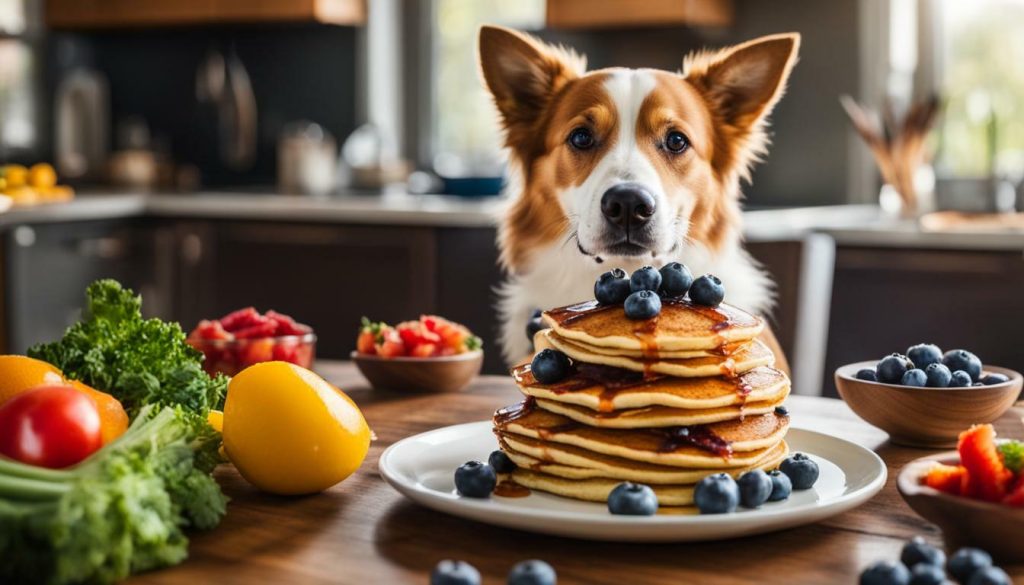
Table 1: Suitable Pancake Toppings for Dogs
| Topping | Safety for Dogs |
|---|---|
| Strawberries | Safe and a good source of vitamins |
| Peanut Butter | Safe in moderation, but avoid xylitol |
| Bananas | Safe and a good source of potassium |
| Apples | Safe, but remove seeds and core |
When preparing pancakes for your furry friend, it’s best to avoid using artificial syrups or sweeteners as they can be high in sugars and contribute to obesity and diabetes. Many artificial syrups also contain xylitol, a sweetener that is toxic to dogs. Opt for natural toppings like the ones mentioned in Table 1 to enhance the flavor and nutritional value of the pancakes. However, always remember that moderation is key when it comes to feeding pancakes to dogs.
Pancake Recipes for Dogs
Here are two simple and dog-friendly pancake recipes you can try at home:
- Plain Pancakes: Mix 1 cup of whole wheat flour, 1 cup of milk, 1 egg, and 1 tablespoon of melted butter. Cook small spoonfuls on a non-stick pan until golden brown.
- Blueberry Pancakes: Add 1/2 cup of fresh blueberries to the plain pancake recipe above. Be sure to rinse the blueberries before adding them.
Remember, these recipes are meant to be occasional treats and not a replacement for your dog’s regular diet. Always consult with your veterinarian before introducing new foods to your dog, especially if they have any specific health conditions or dietary restrictions.
Understanding the Ingredients: What Makes Pancakes Dog-Friendly?
To understand whether pancakes are suitable for dogs, it’s important to analyze the individual ingredients and how they may affect our furry friends. Plain pancakes made with simple ingredients like egg, milk, flour, butter, sugar, and baking powder are generally safe for dogs to eat. However, it’s crucial to be mindful of certain ingredients that can be harmful to dogs.
Raisins: Raisins, commonly used as a topping, are toxic to dogs and should be avoided at all costs. Even a small amount can cause kidney failure.
Sugar-Free Maple Syrup: Sugar-free maple syrup often contains xylitol, a sweetener that is highly toxic to dogs. Xylitol consumption can lead to a sudden drop in blood sugar levels and liver damage. It’s essential to choose regular maple syrup without any artificial sweeteners.
Chocolate: Chocolate is toxic to dogs due to the presence of theobromine. It can cause various symptoms like vomiting, diarrhea, rapid breathing, increased heart rate, and even seizures. Dogs should never consume pancakes with chocolate chips or chocolate-flavored toppings.
| Safe Ingredients | Harmful Ingredients |
|---|---|
| Egg | Raisins |
| Milk | Sugar-Free Maple Syrup (with xylitol) |
| Flour | Chocolate |
| Butter | |
| Sugar | |
| Baking Powder |
“To ensure the safety of our furry companions, it’s crucial to avoid feeding them pancakes with harmful ingredients such as raisins, sugar-free maple syrup, or chocolate. Stick to the basic pancake recipe without any additional toppings or mix-ins that may be potentially toxic.”
While plain pancakes made with these safe ingredients can be given as an occasional treat, it’s important to note that they don’t provide any significant nutritional benefits for dogs. Pancakes should only be considered as an indulgent snack rather than a regular part of their diet. If you’d like to add some flavor or variety, you can introduce dog-friendly toppings like mashed bananas, fresh berries, or a spoonful of peanut butter. Always remember to feed pancakes in moderation and be mindful of your dog’s overall caloric intake to maintain their health and well-being.
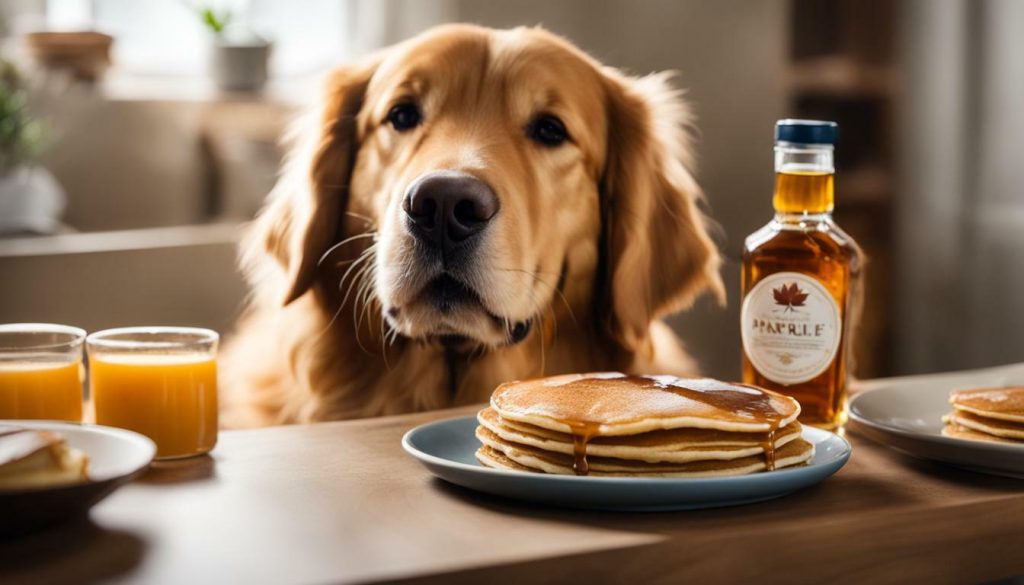
- “Can Dogs Eat Pancakes?” DogTime, www.dogtime.com/can-dogs-eat-pancakes.
- “Human Foods Dogs Can and Can’t Eat.” American Kennel Club, www.akc.org/expert-advice/nutrition/human-foods-dogs-can-and-cant-eat/.
The Perfect Pancake Recipes for Dogs
Who doesn’t love trying out new recipes? Let’s whip up some delicious pancake treats that your dog will adore! Making homemade pancakes for your furry friend allows you to control the ingredients and ensure they are safe and dog-friendly. Here are a few simple and tasty pancake recipes that are sure to make their tails wag.
1. Banana Oat Pancakes
Ingredients:
- 1 ripe banana, mashed
- 1 cup oats
- 1/2 cup plain yogurt
- 1 egg
- 1/4 cup water (add more if needed to achieve desired consistency)
Instructions:
- In a mixing bowl, combine the mashed banana, oats, yogurt, and egg.
- Add water gradually and mix until you have a thick, pourable batter.
- Heat a non-stick skillet or griddle over medium heat and lightly grease with cooking spray or a small amount of oil.
- Pour small dollops of batter onto the skillet and cook for about 2-3 minutes on each side, until golden brown.
- Once cooked, let the pancakes cool before serving them to your dog.
These pancakes are not only delicious but also packed with nutrients from the banana and oats. Your dog will love the sweet taste and soft texture, making this recipe a definite winner.
2. Pumpkin Peanut Butter Pancakes
Ingredients:
- 1/2 cup canned pumpkin (make sure it’s pure pumpkin puree without any added sugar)
- 1/4 cup peanut butter (make sure it does not contain xylitol)
- 1 cup whole wheat flour
- 1 teaspoon baking powder
- 1/2 cup water (add more if needed to achieve desired consistency)
Instructions:
- In a mixing bowl, combine the pumpkin and peanut butter until well blended.
- Add the whole wheat flour and baking powder, mixing until you have a thick batter.
- Gradually add water and stir until the batter becomes smooth and pourable.
- Preheat a non-stick skillet or griddle over medium heat and lightly grease.
- Pour small portions of batter onto the preheated surface, cooking for about 2-3 minutes on each side or until golden brown.
- Allow the pancakes to cool before serving them to your dog.
These pancakes are a savory delight for your pup and provide the added benefits of pumpkin’s fiber and vitamins. The peanut butter adds a rich and nutty flavor that canines simply can’t resist!
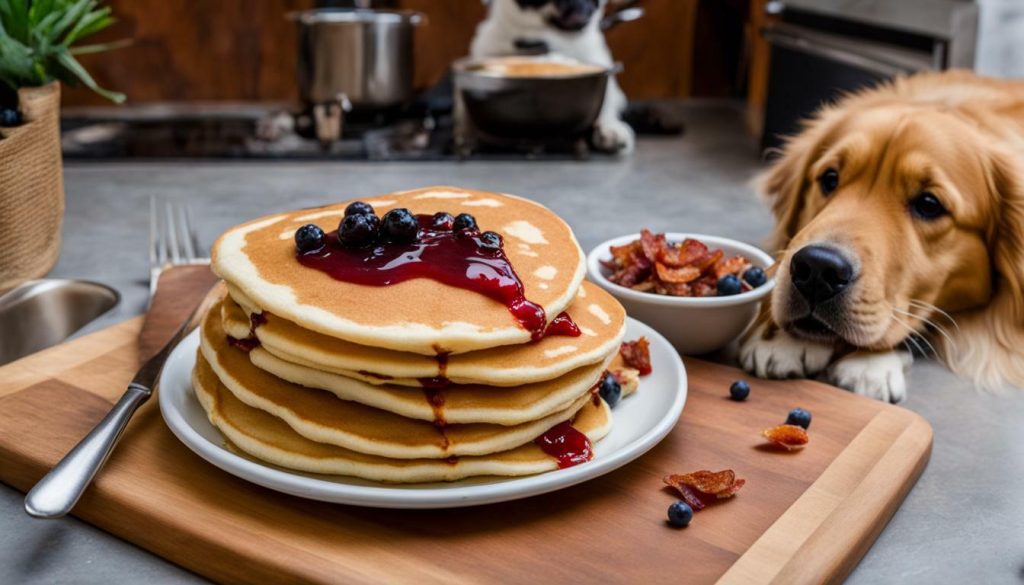
3. Blueberry Yogurt Pancakes
Ingredients:
- 1 cup whole wheat flour
- 1/2 cup plain yogurt
- 1/2 cup water (add more if needed to achieve desired consistency)
- 1/2 cup fresh blueberries
Instructions:
- In a mixing bowl, combine the whole wheat flour and yogurt until well mixed.
- Gradually add water and stir until you have a smooth batter.
- Gently fold in the fresh blueberries.
- Heat a non-stick skillet or griddle over medium heat and lightly grease.
- Pour small portions of batter onto the preheated surface and cook for about 2-3 minutes on each side or until golden brown.
- After cooling, serve these delightful blueberry yogurt pancakes to your furry friend.
This recipe combines the goodness of whole wheat flour and the tart sweetness of blueberries. The addition of yogurt adds a creamy texture and a boost of probiotics, promoting a healthy digestive system.
Remember, moderation is key when feeding pancakes to your dog. Treat pancakes as occasional indulgences and keep an eye on your pet’s overall calorie intake. Enjoy making these pancakes and savor the joy on your dog’s face as they indulge in their special treats!
Potential Risks and Allergies to Consider
While pancakes can be a delightful treat, it’s crucial to be aware of potential risks and allergies that could impact your dog’s health. Certain ingredients commonly found in pancakes can be harmful or even toxic to dogs. It’s important to avoid ingredients like chocolate, raisins, and sugar-free maple syrup, as they can cause serious health issues for our furry friends.
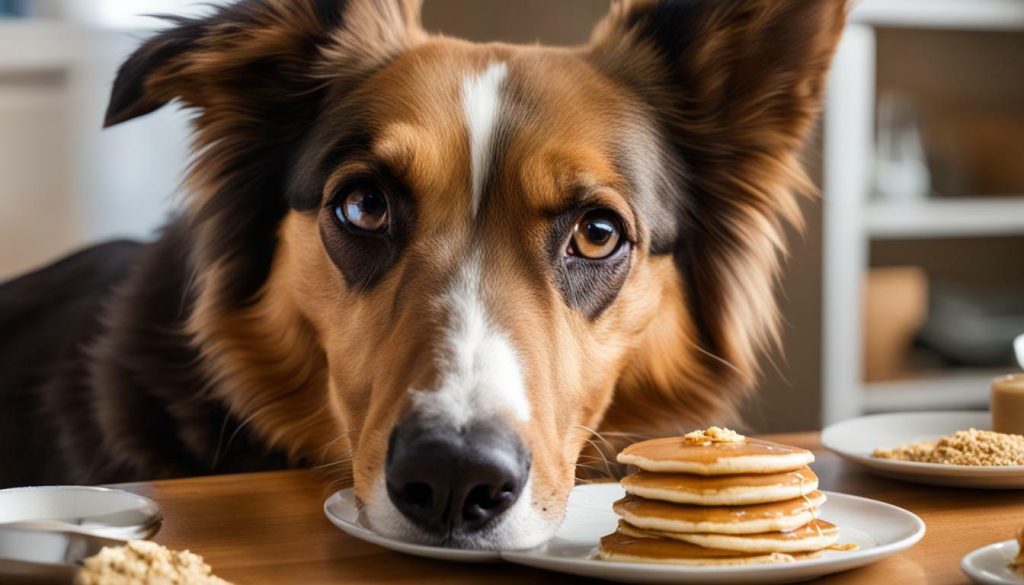
One popular topping that many dog owners wonder about is peanut butter. While dogs generally love the taste of peanut butter, it’s important to choose a peanut butter that is safe for dogs. Make sure it does not contain xylitol, a sweetener that is toxic to dogs. Additionally, peanut butter is high in fat and calories, so it should only be given in small amounts as an occasional treat. Always check the ingredients label to ensure there are no additives or artificial sweeteners that could harm your dog.
When offering pancakes to your dog, plain pancakes are the safest option. Dogs should not consume pancakes with syrup, whether it’s regular syrup or sugar-free syrup. Syrup is high in sugars and can lead to obesity and diabetes in dogs. Some artificial syrups also contain xylitol, which is extremely toxic to dogs. It’s best to avoid any pancake toppings that contain added sugars or artificial sweeteners.
| Type of Pancake | Safety for Dogs |
|---|---|
| Plain Pancakes | Safe in moderation |
| Pancakes with Fruits (Strawberries, Bananas, Apples, Blueberries) | Safe as an occasional treat |
| Pancakes with Peanut Butter | Safe in small amounts, avoid xylitol |
| Pancakes with Syrup (Regular or Sugar-free) | Avoid, high in sugars and may contain xylitol |
It’s also important to be aware of any possible allergies your dog may have. Some dogs may be intolerant or allergic to certain ingredients found in pancakes, such as dairy or wheat. If you notice any unusual symptoms like vomiting, diarrhea, or skin irritation after feeding your dog pancakes, it’s best to consult with your veterinarian. They can help determine if your dog has any food sensitivities or allergies that need to be addressed.
Pancakes and Health Conditions
It’s important to consider your dog’s overall health and any pre-existing conditions when feeding them pancakes. While plain pancakes made with simple ingredients are generally safe for dogs, certain health conditions may require additional precautions. Here are some key considerations:
- Pancakes and Obesity: Dogs that are overweight or prone to obesity should only have pancakes as an occasional treat. Pancakes are high in carbohydrates and calories, which can contribute to weight gain if consumed in excess. It’s best to consult with your veterinarian to determine the appropriate portion size and frequency of pancake consumption for your dog.
- Pancakes and Diabetes: Dogs with diabetes should avoid sugary toppings like syrup or pancakes made with sugar. These can cause spikes in blood sugar levels and disrupt insulin regulation. Instead, opt for diabetic-friendly alternatives or consult with your veterinarian for appropriate treat options.
- Pancakes and Heart Disease: Some pancake ingredients, such as almond flour or protein pea, may be suitable for dogs with certain dietary restrictions. However, dogs with heart disease should avoid pancakes made with pea protein due to potential risks. It’s best to consult with your veterinarian for guidance on suitable pancake ingredients for dogs with heart conditions.
Remember, pancakes should never replace a balanced and nutritionally complete diet for your dog. They should always be given in moderation and as an occasional treat, taking into account your dog’s specific health needs and any dietary restrictions.
It is always recommended to consult with your veterinarian before introducing any new food into your dog’s diet, especially if your dog has pre-existing health conditions or dietary restrictions. Your veterinarian can provide personalized guidance and recommendations based on your dog’s individual needs.
| Pancake Ingredients to Avoid for Dogs | Pancake Toppings to Avoid for Dogs |
|---|---|
| Raisins | Sugar-free maple syrup (contains xylitol) |
| Chocolate | Artificial syrups with xylitol |
| Sugar-free or artificially sweetened pancake mixes | Unsuitable fruit toppings (e.g., grapes, cherries) |
Always read ingredient labels carefully and ensure your pancakes are free from any harmful ingredients for dogs. Remember, moderation is key when it comes to treating your dog to pancakes.
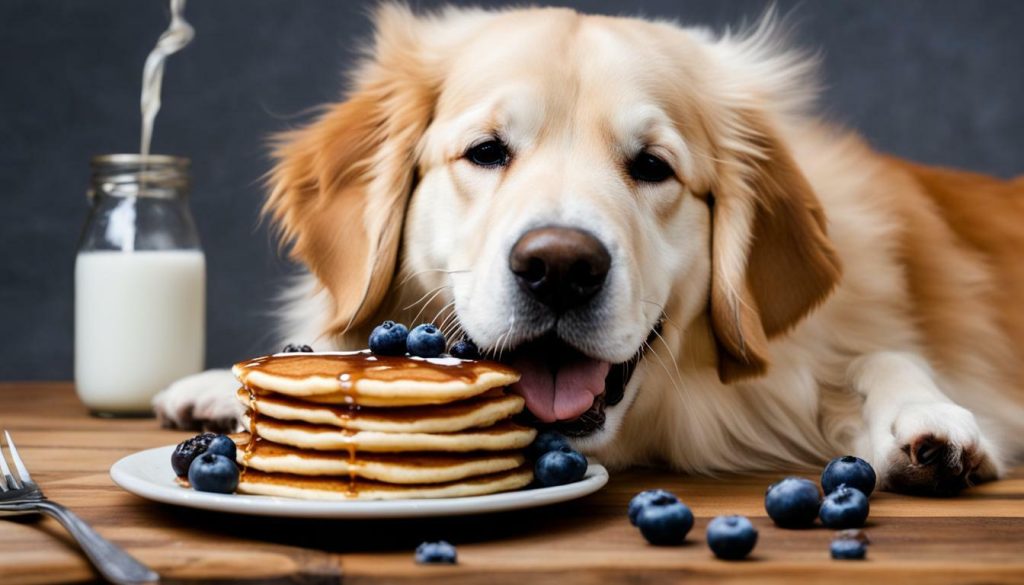
Can Cats Have Pancakes?
Now that we’ve covered dogs, let’s briefly address whether our feline companions can also enjoy pancakes. While cats are obligate carnivores and have different dietary requirements than dogs, small amounts of plain pancakes can be given as an occasional treat. However, it’s important to note that not all cats will be interested in or tolerate pancakes, as their taste preferences differ from those of dogs. Additionally, pancakes should never replace a balanced and species-appropriate diet for cats.

Plain pancakes made with simple ingredients like egg, milk, flour, butter, sugar, and baking powder are generally safe for cats to consume in small quantities. However, it is crucial to avoid ingredients that are toxic to cats, such as chocolate, raisins, or any artificial sweeteners like sugar-free maple syrup that may contain xylitol. Cats also lack the necessary enzymes to break down lactose, so it’s best to avoid using dairy milk in pancake batter for cats.
If you decide to offer pancakes to your cat, ensure they are plain, without any toppings or syrups. Cats have unique dietary requirements, primarily consisting of high-quality animal protein, so pancakes should not be a regular part of their diet. As with any new food, it’s essential to introduce pancakes slowly, in small amounts, and monitor your cat for any adverse reactions or digestive issues.
Remember that each cat is different, and what may be suitable for one cat may not be well-tolerated by another. Always consult with your veterinarian before introducing any new food to your cat’s diet, including pancakes. They can provide guidance based on your cat’s specific nutritional needs and any underlying health conditions.
In summary, while cats can have pancakes in moderation, it’s important to prioritize their dietary needs and provide them with a balanced and appropriate diet. Pancakes should be seen as an occasional indulgence rather than a regular treat for our feline friends. As with any food, it’s crucial to monitor your cat’s response and consult with a veterinarian if you have any concerns about their dietary choices.
| Pancakes for Cats: Dos and Don’ts |
|---|
|
Moderation is Key: Feeding Pancakes Responsibly
Although pancakes can be a delightful treat, it’s crucial to exercise moderation and responsible feeding practices. While it is safe for dogs to eat plain pancakes made with simple ingredients like egg, milk, flour, butter, sugar, and baking powder, they should only be given as an occasional indulgence rather than a regular part of their diet.
When feeding pancakes to your furry friend, it’s important to consider their caloric intake and potential health issues. Dogs that are prone to obesity or diabetes may need to avoid pancakes altogether or have them sparingly. The high sugar content in pancake syrup can lead to weight gain and an increased risk of diabetes in dogs, so it’s best to skip the syrup altogether.
It’s also essential to be mindful of any potential toxic ingredients. Foods like chocolate, raisins, and sugar-free maple syrup can be harmful or even fatal to dogs. These ingredients should be strictly avoided when making pancakes for your canine companion.
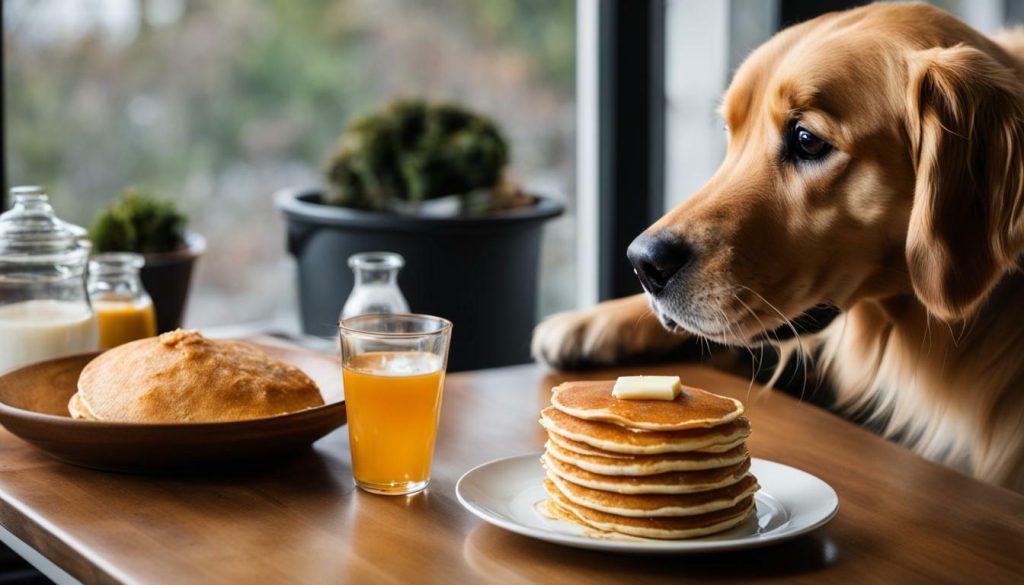
| Pancake Type | Can Dogs Have It? |
|---|---|
| Plain Pancakes | Yes, but in moderation |
| Pancakes with Blueberries or Bananas | Yes, as an occasional treat |
| Pancakes with Chocolate, Raisins, or Sugar-Free Maple Syrup | No, these ingredients are toxic to dogs |
| Pancakes with Fruit Toppings | Yes, as long as the fruits are safe for dogs |
| Pancakes with Artificial Syrup | No, these syrups can contain xylitol, which is toxic to dogs |
Remember, every dog is different, and it’s crucial to consider their specific dietary needs and potential health conditions. If you’re unsure about whether pancakes are suitable for your dog or how often they should be given, it’s always best to consult with your veterinarian.
Conclusion
Now that you’re armed with all the paw-some facts about dogs and pancakes, you can confidently treat your furry friend to a delicious pancake snack while ensuring their health and well-being.
Can dogs eat pancakes? The short answer is yes, but it should be in moderation and without any toxic ingredients such as chocolate, raisins, or sugar-free maple syrup. Plain pancakes made with simple ingredients like egg, milk, flour, butter, sugar, and baking powder are safe for dogs to eat, but they don’t provide any nutritional benefits.
It is important to consider the caloric intake and potential health issues like obesity and diabetes, so pancakes should only be given as an occasional treat rather than a staple in the dog’s diet. Toppings like strawberries, peanut butter, bananas, and apples can be added, but raisins and sugar-free maple syrup should be avoided.
Pancakes made from different types of flour, protein, or almond flour are fine for dogs as long as they are plain and given in moderation, but pea protein should be avoided due to potential heart disease risks. Dogs should not eat pancakes with syrup as it is high in sugars and can lead to obesity and diabetes, and many artificial syrups contain xylitol which is toxic to dogs. Blueberry or banana pancakes are okay as an occasional treat, but excessive consumption can lead to health issues. Dogs should not eat vanilla pancakes or any pancakes made with vanilla extract as it may contain alcohol, and some extracts can also contain xylitol. It is important to feed dogs pancakes moderately and be aware of potential symptoms of overconsumption or allergies. Pancakes should not be given to dogs with dairy intolerance or allergies.
FAQ
Can dogs safely eat pancakes?
Yes, dogs can eat pancakes, but it should be in moderation and without any toxic ingredients such as chocolate, raisins, or sugar-free maple syrup.
What kind of pancakes can dogs eat?
Dogs can eat plain pancakes made with simple ingredients like egg, milk, flour, butter, sugar, and baking powder. However, keep in mind that pancakes don’t provide any nutritional benefits for dogs.
Can dogs have toppings on their pancakes?
Yes, toppings like strawberries, peanut butter, bananas, and apples can be added to a dog’s pancakes. However, raisins and sugar-free maple syrup should be avoided.
Are there any specific pancake ingredients that dogs should avoid?
Dogs should avoid pancakes made with pea protein due to potential heart disease risks. Pancakes with syrup should also be avoided as they are high in sugars and can lead to obesity and diabetes.
Are blueberry or banana pancakes safe for dogs?
Blueberry or banana pancakes are okay as an occasional treat for dogs, but excessive consumption can lead to health issues. Dogs should not eat vanilla pancakes or any pancakes made with vanilla extract as it may contain alcohol.
Can dogs with dairy intolerance or allergies eat pancakes?
Dogs with dairy intolerance or allergies should not be given pancakes as they contain milk. It’s important to be aware of potential symptoms of overconsumption or allergies in dogs.
